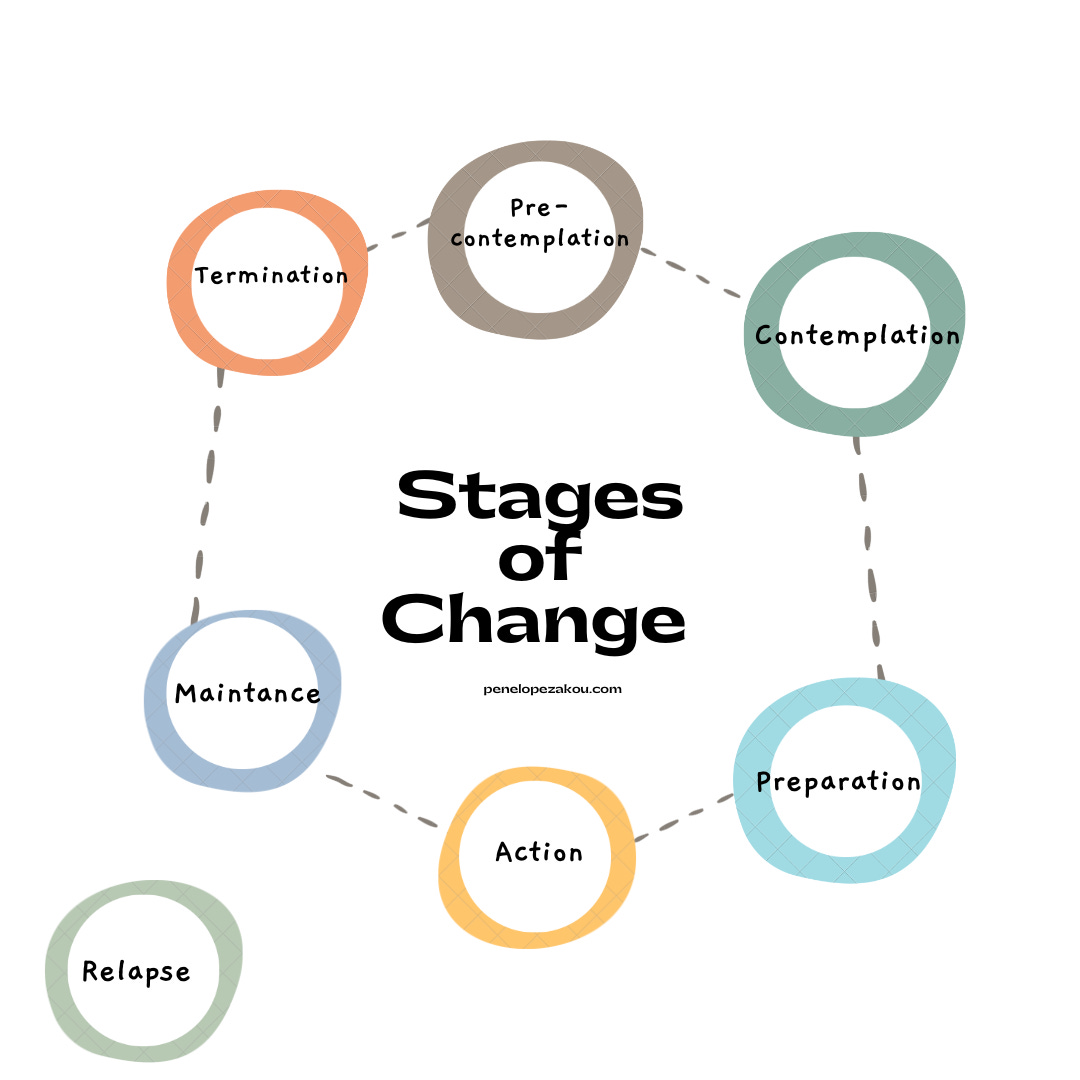The Cycle of Change 🦁
WHAT…a…MONTH!
The weather in Cyprus has been shifting a lot lately. We went from 30°C degrees (86°F) to thunderstorms and hail then back to 30°C degrees heat and we are expecting thunderstorms again this weekend! This back and forth in temperature sparked some thoughts on the Cycle of Change, which I'd love to share with you this week!
The Trans-theoretical Model of Behavioural Change is a model I’m quite fond of because, just like nature, it operates on the assumption that behavioural change follows a cyclical process in which people tend to recycle through. In addition to that, (and similar to what’s been going on with our weather here in Cyprus) this model also suggests that we can sometimes also regress through the stages rather than follow a straight trajectory.
The stages that one cycles through are as follows:
1. Pre-contemplation - ⏸
In pre-contemplation we can be slightly jaded, de-motivated and are actually quite resistant to change.
2. Contemplation - 🌱
In the contemplation stage we’ve become aware of the desire to change something about our life or our behaviour. We could be exploring the reasons and possibilities of change by we just ain’t ready to take the plunge!
3. Preparation – 🧑🍳
Whoop, whoop! The pros of change are officially overweighing the cons, baby! We are gathering our strength, our mental and physical tools and are putting a plan in place. (This is the ideal stage to start a new programme or start working with a coach… *cough* me 😉)
4. Action –🎬
We know we are in the stage of action when we’ve been taking action and sticking to our plan for a couple of months now. Our discipline is on point, and we are consciously and DELIBERATELY avoiding triggers and temptations.
5. Maintenance – 🌳
We’ve successfully maintained the change of behaviour for 6 + months now. Although we are still facing challenges, we find it easier and much less mentally challenging to keep to our plan and carry on.
6. Termination – 🎯
Our new way of being no longer proves to be challenging, in fact- it’s actually become our new normal! Our self-efficacy is at 100% and the behaviour has become automatic, the new beliefs have been embedded into our brain’s programming and previous triggers or temptations no longer have power over us.
…Relapse…
It's good to keep in mind that we may have a potential visitor called Relapse come and visit us, without warning, at any point throughout this cycle. Now, not all of us will experience this but some of us will, and that’s perfectly NORMAL. It’s important to accept Relapse as part of the process because if it does occur, the worst thing we can do is beat ourselves up about it. Instead, this is the time to be even more understanding and loving towards ourselves and utilise this experience as a learning tool, as a way to restructure our plan and RECOMMIT to our goals. If we build our self-awareness through this process we can use this time to strengthen and improve our efforts towards change. By reinforcing long term objectives on a daily basis we can also move towards making conscious adjustments, no matter how small or big that adjustment may be.
Journal Prompts of the Week
- Have I ever experienced an “aha” moment when something shifted and changed for the better? When was the last time?
- What are some of the most significant changes that have happened in the past month? (or in the past year)
- How do I feel about these changes and how have they impacted my life so far?
- What’s one thing I would like to change about my life as it is now and why?
- Aim I willing to start making this change today? If not, do I think I'm willing to start making this change in the near future?
- What steps am I willing to take to change that one thing?
As always, I'd love to hear about what the above sparked in you! ⚡️
Hasta la próxima, Coach Penelope 💋

References:
Prochaska, J O et al. “In search of how people change. Applications to addictive behaviors.” The American psychologist vol. 47,9 (1992): 1102-14. doi:10.1037//0003-066x.47.9.1102
Norcross, John C et al. “Stages of change.” Journal of clinical psychology vol. 67,2 (2011): 143-54. doi:10.1002/jclp.20758